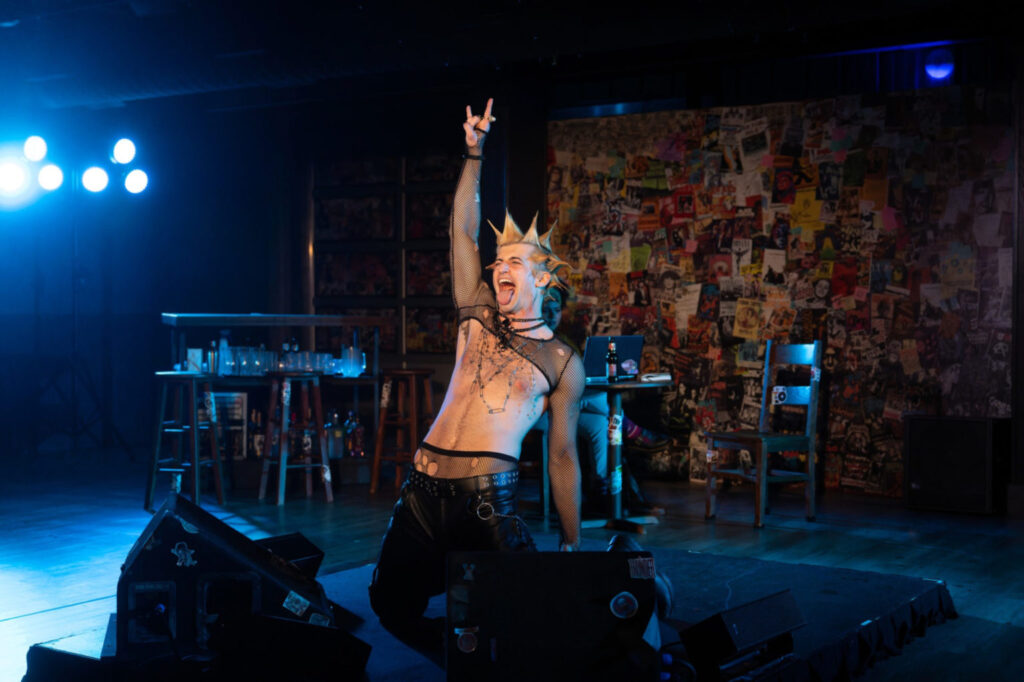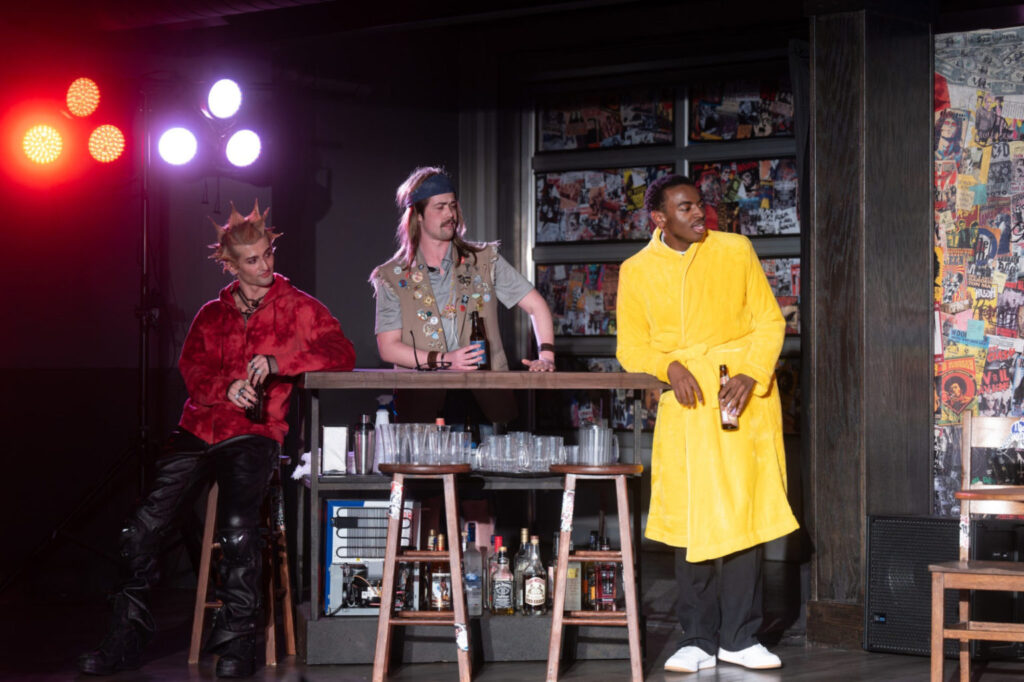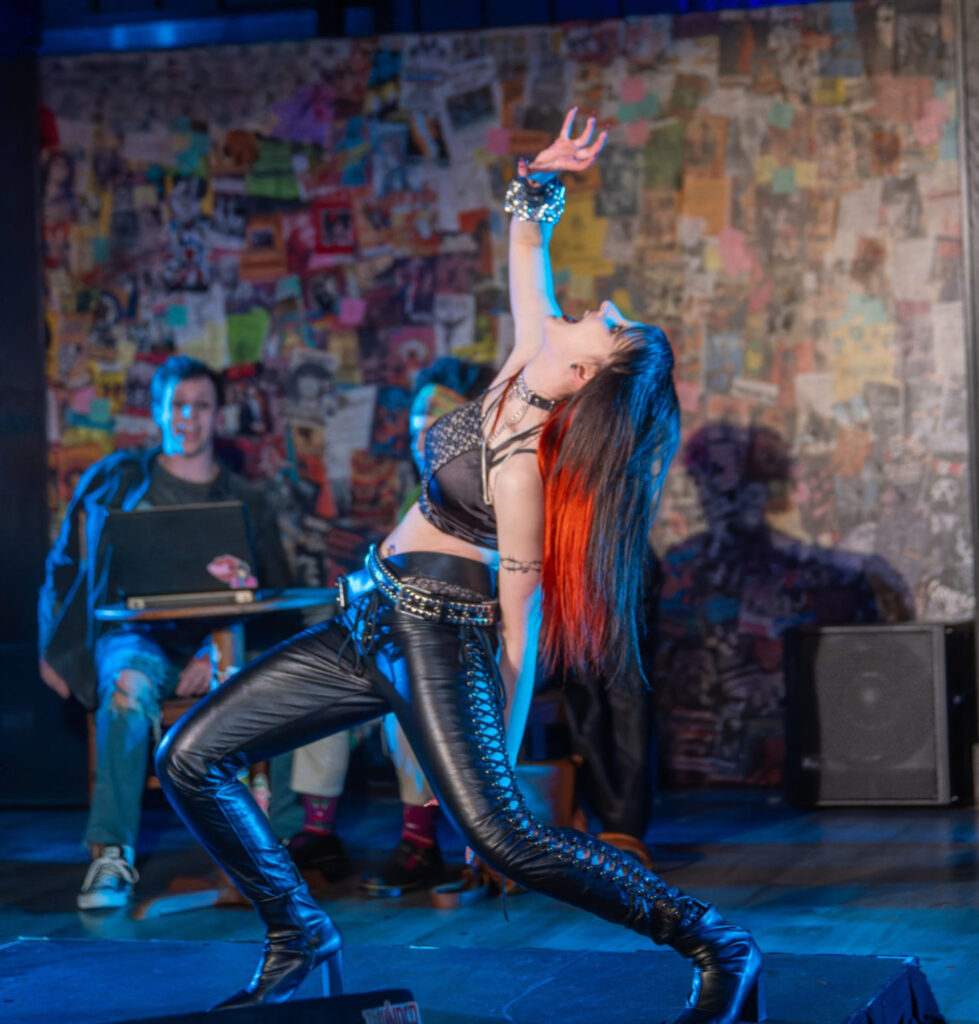by Derrick Philips |

Illinois Theatre recently unveiled a production that, quite literally, plays the air: Airness by Chelsea Marcantel. Staged at Fat City Bar and Grill, a venue that, before this event, had been criminally underutilized for live performances of any kind, the play made a compelling case for why this should change.
As patrons filled the theater-style seating, a playlist of 70s and 80s guitar rock classics like Van Halen’s “Panama,” Guns and Roses’ “Paradise City,” and Led Zeppelin’s “Stairway to Heaven” played over the P.A. system, setting the tone for what was to be a fun and energizing night. The set itself was a mini-replica of a similar bar and embodied the rock and roll vibe needed to propel the narrative of Airness.
The production’s set was nothing short of a visual love letter to classic rock and the ethos of air guitar competitions. A meticulously designed stage, complete with a bar cart brimming with bottles and glasses and a backdrop adorned with iconic rock show posters, transported the audience into the vibrant world of air guitar aficionados. This attention to detail wasn’t just commendable for a college theater production — it was transformative, making Fat City the perfect vessel for Airness to sail. The set design could arguably be the star of this production.

On its first night, Airness proved its draw by filling every available seat, three-quarters occupied by students, a testament to either the play’s allure or the community’s hunger for live entertainment — or perhaps both. The cast, a blend of seasoned and emerging talent from the University of Illinois, dove headfirst into their roles, embodying their characters’ quirks, passions, and dreams with a sincerity that bridged the gap between stage and audience.
The play itself is a comedic exploration of the world of competitive air guitar through the eyes of Nina, a genuine guitarist who underestimates the art until she is immersed in its world. It’s a journey of discovery, not just of the “airness” that makes a performance transcend, but of oneself and the community that binds these performers together.
The Nina, which became Nina’s stage persona, was played with great heart, emotion and enthusiasm by sophomore Jazmin Wilkins. Wilkins’ character bursts into the production as a naive newby, initially believing that her actual guitar playing skills will be enough to head straight to the top, but learning quickly that technical merit is just one category performers are judged on, and the mysterious category of “airness” is what she really needs to master air guitar. The audience falls in love with Nina right off the bat, largely due to Wilkins’ performance.
The lovable underdog arrives at the first qualifying competition of the play and runs headfirst into the other regulars who initially welcome her, but quickly establish she’s got a lot to learn to be one of their peers. Nina’s heart seems pure and her ambition seems genuine, until a scene with Cannibal Queen where a very coincidental love triangle is revealed. That’s the point where Nina’s motivation seems to be more about revenge than becoming an air guitar champion. Wilkins had already made the crowd fall for Nina, so there was an audible groan when this character flaw was revealed. Wilkins’ portrayal of Nina ran the gamut of nearly every emotion, and she explored all with great depth on stage. By the end of the play, The Nina’s intentions were pure and unbridled.
The antagonist, D Vicious, brilliantly portrayed by David Sommer, evolves from a ladies’ man to a figure of isolation, his journey mirroring the darker, more introspective themes of ambition, betrayal, and the quest for authenticity. In the beginning of the play, we get to see his national championship-winning performance from last year, playing the song “Cum on Feel the Noise” by Quiet Riot. Vicious is a cocky, handsome punk-wannabe, who believes his national championship-winning performance should be enough to continuously make the world bow down to worship him, a sentiment his former friends on the circuit abhor, and ultimately a large part of the reason an irreversible wedge is driven between him and his fellow competitors. Sommers plays the character with a dash of self-doubt, embodied in a flashback scene where he is filming a commercial for Sprite after winning the championship, and he struggles mightily to deliver the performance the director is looking for. The video of his struggles end up on the internet and become something his air guitar friends find funny and sad. Vicious slowly accumulates the role of antagonist during Airness, and is almost thoroughly unlikeable by the end of the play.

Cannibal Queen, played ferociously by U of I senior Mary Jane Oken, is one of the few women on the circuit. Oken plays her as a loud and brash woman, living life on her own terms and not caring much about what everyone around her thinks. Cannibal Queen and Vicious share a sense of rock and roll style in their manner of dress, both adorned in leather, buckles, and studs, as well as full-on punk-rock hairstyles, with Vicious also adorning a ripped fishnet shirt exposing his six-pack abs like a typical rockstar. Near the beginning of the play, it’s revealed that Cannibal Queen and D Vicious were an item, but later on, it turns out Cannibal Queen is married and enjoying an open relationship with Vicious. I struggled to determine the relevance of that to the plot, and the topic wasn’t explored or explained further. This did little to derail my enjoyment of the performance, however.
Supporting characters like Shreddy Eddy (played by Jonathan Kaplan), Golden Thunder (played by Noah Smith) and Facebender (played by Patrick Johnson) enrich the narrative, each bringing their unique perspective to the fore. Their interactions with Nina, filled with humor, heartache, and revelations, form the emotional core of the play, exploring themes of friendship, rivalry, and the search for one’s place in the world. As the announcer and Sprite executive, U of I sophomore Harrison Brown got the crowd riled up to cheer in all the right places, and also with enough force to squash the spirit of Vicious during his Sprite commercial debacle.

The play’s soundtrack, an ode to ’80s rock and punk, serves as more than background music; it’s integral to the storyline and characters’ development. Yet, Airness transcends its musical themes to reflect on personal choice, identity, and the joy found in embracing one’s passions, no matter how unconventional.
In the climactic finale of Airness, the barrier between performers and the audience further dissolves as the City Center’s main stage comes alive. As the large garage doors between Fat City and City Center retract, attendees are ushered into an electrified atmosphere for the National Air Guitar Finals. This scene is a vivid tableau of ambition, artistry, and raw emotion, magnified by dazzling stage lights and animated portrayals of the characters on large screens. Each performance during the final scene is a testament to the play’s themes of passion, identity, and community. The competition’s high stakes, combined with the actors’ physical and emotional exertion, culminate in a moment of triumphant unity, irrespective of the competition’s outcome. Nina’s journey — marked by self-discovery, camaraderie, and a newfound love — reaches its zenith in a passionate embrace, symbolizing her full immersion into and acceptance by the air guitar tribe.
In the end, Airness isn’t just a play about air guitar. It’s a celebration of the oddities and passions that unite us, a testament to the fact that sometimes, the most profound truths are found in the most unexpected places. As the lights dimmed on Fat City Bar and Grill, it felt like this production had not only succeeded in bringing Airness to life, but had also defined the joy of doing something you love, no matter how weird it may be. The play lingers, not just as a memory of a night spent in the company of strangers bound by a shared experience, but as a reminder of the beauty in the absurd, the strength in vulnerability, and the “‘airness” that resides within us all.







